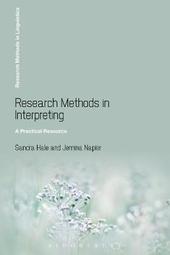
|
Research Methods in Interpreting: A Practical Resource
Hardback
Main Details
| Title |
Research Methods in Interpreting: A Practical Resource
|
| Authors and Contributors |
By (author) Sandra Hale
|
|
By (author) Dr Jemina Napier
|
| Series | Research Methods in Linguistics |
|---|
| Physical Properties |
| Format:Hardback | | Pages:288 | | Dimensions(mm): Height 234,Width 156 |
|
| ISBN/Barcode |
9781441147707
|
| Classifications | Dewey:418.020721 |
|---|
| Audience | | Tertiary Education (US: College) | | Professional & Vocational | |
|---|
|
Publishing Details |
| Publisher |
Bloomsbury Publishing Plc
|
| Imprint |
Bloomsbury Academic USA
|
| Publication Date |
5 December 2013 |
| Publication Country |
United States
|
Description
This is the first book to deliver a comprehensive guide to research methods in all types of interpreting. It brings together the expertise of two world-recognized scholars in spoken and signed language interpreting to cover the full scope of the discipline. It features questions, prompts and exercises throughout to highlight key concepts, provoke thought and encourage reader interaction. It deals fully with research in both conference and community interpreting, offering a variety of perspectives on both. Core areas such as reading and analyzing research literature, practical issues in research and producing research reports are all covered. This book is an indispensable tool for students and researchers of Interpreting as well as professionals and interpreter trainers.
Author Biography
Sandra Hale is Professor of Interpreting & Translation and Chair of the Research Committee at the School of International Studies at the University of New South Wales, Australia. Jemina Napier is Professor and Chair of Intercultural Communication at Heriot-Watt University, Scotland.
ReviewsAs a practitioner, researcher and educator in the field of interpreting for over two decades, I would recommend this book as an outstanding resource to anyone involved in interpreting or linguistics research. * New Zealand Studies in Applied Linguistics * This book is a blessing both for students making their first tentative steps into the world of research and also for more experienced academic staff who may be supervising dissertations and theses for the first time. It is a clearly written, step by step guide designed to demystify the often arcane field of linguistics research. Whilst aimed primarily at students and practitioners of Interpreting Studies, it could also be an excellent resource for students of other disciplines. -- Jo Anna Burn * The International Journal of Interpreter Education Volume 1 * Hale and Napier's practical guide to research methods in interpreting provides a good and comprehensive overview of some of the more traditional and well-established empirical records in the field. -- Kilian G. Seeber * Interpreting, Vol 17:1 * In a field so reliant on empirical studies using a range of methodological approaches, this timely book offers much-needed and eminently user-oriented guidance. Hale and Napier excel in combining a well-founded presentation of key concepts and techniques in empirical research with illustrative hands-on instruction. Rich in up-to-date sources and relevant examples, this volume is an invaluable asset to novice researchers and to the interpreting studies community at large. -- Franz Poechhacker, Associate Professor of Interpreting Studies * University of Vienna, Austria * This is a wonderful addition to the field of interpretation, offering structure and insight into the research methodologies that are available to researchers working with spoken and signed language interpreting. It also demystifies the research process by providing examples that are not only relevant, but that lead the reader to further sources of inspiration and knowledge. Napier and Hale have produced an excellent resource for emerging researchers, and our communities of practice will be the better for having this text. -- Debra Russell, David Peikoff Chair of Deaf Studies * University of Alberta, Canada * Hale and Napier bring their expertise to co-author an outstanding pragmatic contribution to the Interpreting research field. The book provides insightful guidelines for Interpreting PhD candidates embarking on the research journey, as well as for Interpreting educators and students who could equally benefit from this articulate, insightful and methodically presented book. * Australian Review of Applied Linguistics *
|